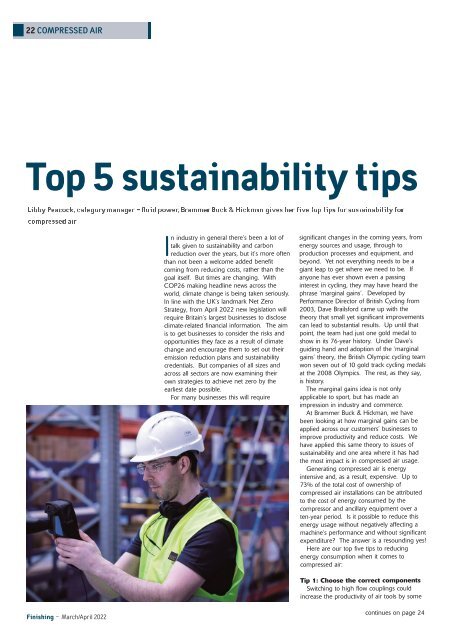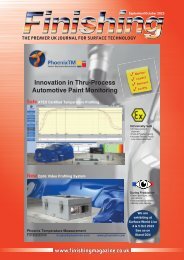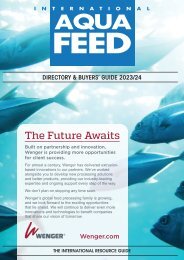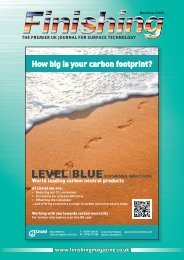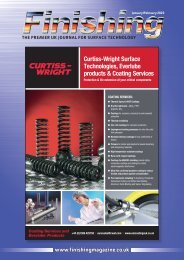Finishing - March-April 2022
Who knew that after coming out of a pandemic, the world could get any worse, but how wrong was everybody. The effects of the war are going to be be huge for industry. Industry that was already under price pressure, but fuel costs now are going to be astronomical. I truly hope that your business survives this latest onslaught. Fair play to all those people volunteering to look after refugees. They have my undying respect and it shows the people of the UK to be a country full of sympathy and humanity. I hope this message is seen from the outside world as I fear that sometimes our leaders may distort how UK citizens really feel. Good luck in the coming months, I think we might need it.
Who knew that after coming out of a pandemic, the world could get any worse, but how wrong was everybody.
The effects of the war are going to be be huge for industry. Industry that was already under price pressure, but fuel costs now are going to be astronomical. I truly hope that your business survives this latest onslaught.
Fair play to all those people volunteering to look after refugees. They have my undying respect and it shows the people of the UK to be a country full of sympathy and humanity. I hope this message is seen from the outside world as I fear that sometimes our leaders may distort how UK citizens really feel.
Good luck in the coming months, I think we might need it.
Create successful ePaper yourself
Turn your PDF publications into a flip-book with our unique Google optimized e-Paper software.
22 COMPRESSED AIR<br />
Top 5 sustainability tips<br />
In industry in general there’s been a lot of<br />
talk given to sustainability and carbon<br />
reduction over the years, but it’s more often<br />
than not been a welcome added benefit<br />
coming from reducing costs, rather than the<br />
goal itself. But times are changing. With<br />
COP26 making headline news across the<br />
world, climate change is being taken seriously.<br />
In line with the UK’s landmark Net Zero<br />
Strategy, from <strong>April</strong> <strong>2022</strong> new legislation will<br />
require Britain’s largest businesses to disclose<br />
climate-related financial information. The aim<br />
is to get businesses to consider the risks and<br />
opportunities they face as a result of climate<br />
change and encourage them to set out their<br />
emission reduction plans and sustainability<br />
credentials. But companies of all sizes and<br />
across all sectors are now examining their<br />
own strategies to achieve net zero by the<br />
earliest date possible.<br />
For many businesses this will require<br />
significant changes in the coming years, from<br />
energy sources and usage, through to<br />
production processes and equipment, and<br />
beyond. Yet not everything needs to be a<br />
giant leap to get where we need to be. If<br />
anyone has ever shown even a passing<br />
interest in cycling, they may have heard the<br />
phrase ‘marginal gains’. Developed by<br />
Performance Director of British Cycling from<br />
2003, Dave Brailsford came up with the<br />
theory that small yet significant improvements<br />
can lead to substantial results. Up until that<br />
point, the team had just one gold medal to<br />
show in its 76-year history. Under Dave’s<br />
guiding hand and adoption of the ‘marginal<br />
gains’ theory, the British Olympic cycling team<br />
won seven out of 10 gold track cycling medals<br />
at the 2008 Olympics. The rest, as they say,<br />
is history.<br />
The marginal gains idea is not only<br />
applicable to sport, but has made an<br />
impression in industry and commerce.<br />
At Brammer Buck & Hickman, we have<br />
been looking at how marginal gains can be<br />
applied across our customers’ businesses to<br />
improve productivity and reduce costs. We<br />
have applied this same theory to issues of<br />
sustainability and one area where it has had<br />
the most impact is in compressed air usage.<br />
Generating compressed air is energy<br />
intensive and, as a result, expensive. Up to<br />
73% of the total cost of ownership of<br />
compressed air installations can be attributed<br />
to the cost of energy consumed by the<br />
compressor and ancillary equipment over a<br />
ten-year period. Is it possible to reduce this<br />
energy usage without negatively affecting a<br />
machine’s performance and without significant<br />
expenditure? The answer is a resounding yes!<br />
Here are our top five tips to reducing<br />
energy consumption when it comes to<br />
compressed air:<br />
Tip 1: Choose the correct components<br />
Switching to high flow couplings could<br />
increase the productivity of air tools by some<br />
<strong>Finishing</strong> - <strong>March</strong>/<strong>April</strong> <strong>2022</strong><br />
continues on page 24


